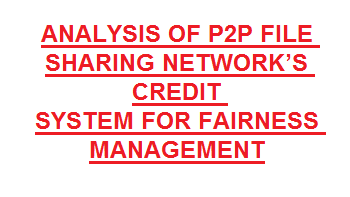ABSTRACT:
Given a substantial arrangement of things and an arrangement of clients, we consider the issue of gathering client inclinations – or appraisals – on things. The paper portrays a basic technique which gives an inexact answer to the issue without requiring every client to rate everything. The technique depends on an iterative procedure. Each progression, or then again vote, requires every client to rate an example of the things. A synergistic sifting calculation is then performed to foresee the missing appraisals and also their level of certainty (which is at first 0). Performing another ticket permits to progress the exactness of expectations. The manager of the framework is in charge of ceasing the emphasis when an acceptable level is come to. We apply this technique to the task of commentators to papers before the audit period of meeting administration and portray its execution in the MY REVIEW online framework.
EXISTING SYSTEM:
Numerous logical meetings these days use amid the accommodation stage a web programming for gathering papers and doling out commentators, (see, for example, [4, 3, 2, 5]). These programming projects additionally give an interface to submit surveys and supply some pretty much-propelled bolster for dialog among analysts when there is no concurrence on a paper. It has normally concurred that the most tedious undertaking when utilizing this kind of programming is the task of analysts to papers. The essential arrangement is a manual process where the overseer (typically the program seat of the gathering) chooses, for each paper, 3 or 4 individuals from the program advisory group (PC). In any case, performing this errand physically is both repetitive and troublesome, in light of the numerous limitations which must be considered: all commentators ought to be allocated around the same number of papers, each paper ought to be assessed by master commentators, there ought to be no irreconcilable circumstance, and so on.
The measure of the issue is likewise an issue: there may be up to a few many submitted papers, and the PC ordinarily comprises of about 40-50 individuals. There is right now little help for this assignment in the current programming projects. Best case scenario (for example in CyberChair [5]), commentators can choose the papers they wish to survey also, a pre-task, in light of these inclinations, is registered and proposed to the administrator. This suggestion is lamentably incompletely helpful, for the most part in light of the fact that data gave by the commentators is inadequate (numerous papers are disregarded) and poor. The task of papers can really be viewed as a particular occasion of a more general issue, in particular, the suggestion of things to clients in electronic frameworks. Recommender frameworks [13] give customized proposals to items or administrations to clients, and their strategies are seriously utilized as a part of online business frameworks to progressively propose things in light of the client’s taste and desire [1, 8, 14].
PROPOSED SYSTEM:
Recommender frameworks depend on learning revelation systems to gather and anticipate inclinations of clients. Among these procedures, community-oriented sifting calculations can be utilized to discover neighbors of a client, i.e., clients who share similar inclinations. Unmistakably, applying these procedures to our concern, considering PC individuals as “clients” also, papers as “things”, can encourage the task of papers, and enhance its unwavering quality. There are anyway a few particularities of our concern that should be specified.
On the negative side, the quantity of individuals in a PC is little with deference to the number of clients which visit a web-based business website, and this constrains the capacity to discover close neighbors amid the synergistic sifting process. On the positive side, while recommender frameworks in online business applications arrange just of certain furthermore, deficient information to find the profile of clients, a program committee comprises of a little arrangement of agreeable and dynamic “clients”, who can be requested express and dependable data with respect to their inclinations.
We portray in this paper a proposal technique in light of working together sifting also, custom fitted to the above specificities – a little gathering of agreeable clients. The strategy permits to register an anticipated rating for each match (PC part, paper), utilizing a multi-step process which enhances ceaselessly the certainty level of the evaluations. To put it plainly, each progression, or ticket, comprises of the accompanying tasks:
(1) for every client, a test of papers whose rating is relied upon to prompt the best certainty level change is chosen,
(2) every client is asked for to rate the papers from its example and
(3) a community-oriented sifting calculation is performed to acquire another arrangement of anticipated appraisals, in light of the clients’ appraisals made up until now. Stage 3 brings about another level of certainty. Contingent upon the unique situation, the overseer would then be able to take another vote or skip to the paper task errand.
The technique has been executed in an electronic meeting administration framework, uninhibitedly accessible for utilizing, which is quickly depicted toward the finish of the paper. Note that, in spite of the fact that we depict the technique and its execution as for a particular application, it may be significant in a more extensive setting. A critical issue with proposal frameworks is the sparsity of data amid the underlying phases of utilization, furthermore, along these lines the absence of exactness of the expectations.
The technique proposed here permits to make a “seed” for the forecast calculations, by thinking about an example of clients, delegate of the numerous profiles which can be met on the Web. Evaluations can be gathered, up to the certainty level required to give a sound help to the proposal module. The example constitutes then a dependable reason for deciding the inclinations of clients.
HARDWARE REQUIREMENT:
Processor : Pentium-IV 2.6GHz
Hard Memory : 40GB
RAM: 1GB
SOFTWARE REQUIREMENT:
Front End: ASP.Net
Back End: Microsoft SQL Server 2000
Working System: Windows XP
Language:C#
Casingwork:: Microsoft Visual Studio 2005



